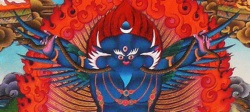Difference between revisions of "Rolang"
| Line 1: | Line 1: | ||
| + | {{SeealsoDPL/button}} | ||
[[File:Garuda-best01.jpg|thumb|250px|]] | [[File:Garuda-best01.jpg|thumb|250px|]] | ||
| + | |||
| + | |||
| + | |||
| + | |||
| + | |||
<poem> | <poem> | ||
| − | A ''[[rolang]]'' is like a zombie. This is a human being whose [[body]] is alive but who is neurologically and psychologically paralyzed to the degree that he or she functions like an automaton. | + | A ''[[rolang]]'' is like a [[zombie]]. This is a [[human being]] whose [[body]] is alive but who is neurologically and {{Wiki|psychologically}} paralyzed to the [[degree]] that he or she functions like an automaton. |
| − | "Wade Davis wrote a book (The Serpent and the Rainbow, 1985) in which he tried to demonstrate that Haitian zombies are people who have been poisoned first with puffer fish poison and then later with {{Wiki|datura}}. They are then kept in a brain-damaged state and sometimes used as laborers. To be zombified is said to be a "fate worse than death" reserved for those who have offended community norms. | + | "Wade Davis wrote a [[book]] (The [[Serpent]] and the [[Rainbow]], 1985) in which he tried to demonstrate that Haitian [[zombies]] are [[people]] who have been poisoned first with puffer {{Wiki|fish}} [[poison]] and then later with {{Wiki|datura}}. They are then kept in a brain-damaged [[state]] and sometimes used as laborers. To be zombified is said to be a "[[fate]] worse than [[death]]" reserved for those who have offended {{Wiki|community}} norms. |
| − | I know that Haitian culture is far from Tibet, however, {{Wiki|datura}} does grow | + | I know that Haitian {{Wiki|culture}} is far from [[Tibet]], however, {{Wiki|datura}} does grow |
in the [[Himalayan]] regions and is one of the [[symbols]] of and [[traditional]] | in the [[Himalayan]] regions and is one of the [[symbols]] of and [[traditional]] | ||
| − | offerings to [[Mahakala]] ([[Dorje Gonpo]]). If I remember correctly, the ancient Scythians in central Asia inhaled [[datura]] fumes in a ritual context. Perhaps [[Tibetan]] [[rolang]] are people who have been brain damaged by deliberate or accidental [[datura]] poisoning who revive after being in a coma. [So] Believing in zombies may not be so irrational after all. [And] It would make killing them a non-meritorious act. | + | [[offerings]] to [[Mahakala]] ([[Dorje Gonpo]]). If I remember correctly, the [[ancient]] {{Wiki|Scythians}} in central {{Wiki|Asia}} inhaled [[datura]] fumes in a [[ritual]] context. Perhaps [[Tibetan]] [[rolang]] are [[people]] who have been {{Wiki|brain}} damaged by deliberate or accidental [[datura]] poisoning who revive after being in a coma. [So] Believing in [[zombies]] may not be so irrational after all. [And] It would make {{Wiki|killing}} them a non-meritorious act. |
| − | A friend of mine who was in [[Tibet]] two years ago said that people he knew took the existence of [[rolang]] for granted and said that the high wooden thresholds of Tibetan houses were to keep them out as they cannot bend their knees. " | + | A [[friend]] of mine who was in [[Tibet]] two years ago said that [[people]] he knew took the [[existence]] of [[rolang]] for granted and said that the high wooden thresholds of [[Tibetan]] houses were to keep them out as they cannot bend their knees. " |
| − | ~ R. Bunger (personal communication, ca. 2000) | + | ~ R. Bunger (personal [[communication]], ca. 2000) |
</poem> | </poem> | ||
Latest revision as of 13:42, 16 December 2015
Click here to see other articles relating to word Rolang
A rolang is like a zombie. This is a human being whose body is alive but who is neurologically and psychologically paralyzed to the degree that he or she functions like an automaton.
"Wade Davis wrote a book (The Serpent and the Rainbow, 1985) in which he tried to demonstrate that Haitian zombies are people who have been poisoned first with puffer fish poison and then later with datura. They are then kept in a brain-damaged state and sometimes used as laborers. To be zombified is said to be a "fate worse than death" reserved for those who have offended community norms.
I know that Haitian culture is far from Tibet, however, datura does grow
in the Himalayan regions and is one of the symbols of and traditional
offerings to Mahakala (Dorje Gonpo). If I remember correctly, the ancient Scythians in central Asia inhaled datura fumes in a ritual context. Perhaps Tibetan rolang are people who have been brain damaged by deliberate or accidental datura poisoning who revive after being in a coma. [So] Believing in zombies may not be so irrational after all. [And] It would make killing them a non-meritorious act.
A friend of mine who was in Tibet two years ago said that people he knew took the existence of rolang for granted and said that the high wooden thresholds of Tibetan houses were to keep them out as they cannot bend their knees. "
~ R. Bunger (personal communication, ca. 2000)
